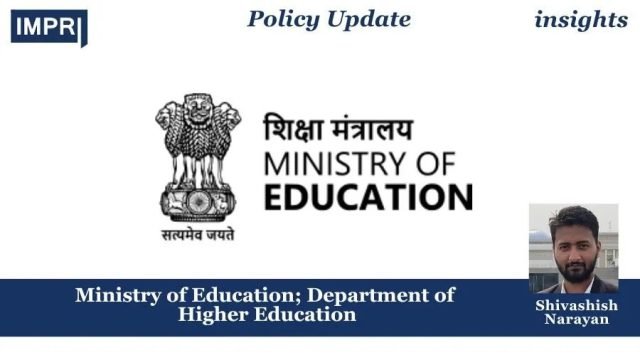Policy Update
Shivashish Narayan
India has recognized education as a cornerstone for socio-economic development leading to the enactment of landmark legislation in 2010 that made free and compulsory education a fundamental right for children aged 6-14. This initiative reflects the country’s commitment to nurturing its most valuable resource: its people.
Established on September 26, 1985, the Ministry of Human Resource Development (now the Ministry of Education) oversees this mission through two key departments: School Education & Literacy and Higher Education. The Ministry formulates the National Policy on Education to ensure equitable access, improve quality and promote inclusivity, particularly for disadvantaged groups through various scholarships and loan subsidies. These efforts aim to create a robust educational framework that not only enhances academic standards but also fosters holistic development preparing students for the challenges of the modern world.
Department of Higher Education
The Department of Higher Education, operating under the Ministry of Education (MoE), is dedicated to enhancing the higher education landscape in India. Its mission centers on ensuring equitable access to higher education for vulnerable groups and improving the Gross Enrolment Ratio (GER) to 30% by 2020. Over the past eight years, the sector has seen substantial growth, with total enrolment rising from 3.42 crore in FY15 to approximately 4.33 crore in FY22, marking a 26.5% increase. According to the All India Survey on Higher Education (AISHE) 2021-22, this growth is accompanied by improved enrolment equity, signifying progress in reaching underrepresented populations.
The National Education Policy (NEP) 2020, approved by the Union Cabinet on July 29, 2020, aims to implement transformative reforms in both school and higher education systems, replacing the outdated National Policy on Education (NPE) from 1986. A critical objective of the NEP is the universalization of education from preschool to secondary level with a target of achieving a 100% GER in school education by 2030. Within higher education, the Department emphasizes expanding institutional capacities and improving quality through academic reforms, skill development, and fostering research and innovation. Initiatives under the NEP aim to create world-class universities, promote collaboration with international institutions, and enhance research output, contributing to a robust and inclusive higher education framework in India.
Schemes
1. Establishment of Multi- Disciplinary Research Universities
Multidisciplinary Education and Research Universities (MERUs) aim to revive India’s ancient tradition of holistic education, as seen in institutions like Nalanda and Takshashila. The National Education Policy (NEP) 2020 emphasizes establishing MERUs to provide diverse learning experiences across various disciplines, including arts, sciences, engineering and vocational studies. These universities will offer multidisciplinary research and teaching programs, fostering innovative thinking and skill development. By 2030, every district will have a MERU, transforming India’s higher education landscape into a globally recognized, integrated system that nurtures well-rounded individuals and enhances research capabilities.
2.Higher Education Financing Agency (HEFA)
The Higher Education Financing Agency (HEFA) was established to fund infrastructure in premier institutions like IITs, IIMs and NITs. With an initial capital of ₹2,000 crore, later expanded to ₹10,000 crore, HEFA raises funds via market borrowings and bonds to support the “RISE by 2022” initiative. It provides 10-year loans, with institutions repaying the principal through internal revenues, while the government covers interest costs. HEFA also mobilizes CSR funds for research. Centrally funded institutions can access HEFA loans under five repayment models, with government support varying based on the institution’s age and financial capacity.
3.World Class Institutions
In the 2016 budget speech, the finance minister announced the creation of ten world-class teaching and research institutions each in the public and private sectors. The initiative aims to elevate Indian higher education to global standards by fostering institutions with high-quality teaching, research and international collaborations. The University Grants Commission (UGC) proposed regulations for selecting and supporting these institutions, with guidelines addressing governance, faculty appointments, financial autonomy and collaborations. An Empowered Experts Committee (EEC) will oversee the selection and evaluation of institutions. This initiative will provide an enabling regulatory framework to promote excellence in education across India.
4.Indian Knowledge Systems
The National Education Policy (NEP) 2020 emphasizes integrating Indian Knowledge Systems (IKS) into all levels of education. IKS encompasses a vast range of traditional Indian knowledge in disciplines like philosophy, science and art, which has evolved over generations. To implement IKS effectively, NEP calls for capacity building of faculty in higher education institutions through teacher training and orientation programs. These programs, conducted by UGC-recognized agencies like HRDC and PMMMNMTT, aim to familiarize faculty with IKS concepts and integrate them into modern curricula. IKS integration will enrich Indian education by merging traditional wisdom with contemporary knowledge.
5.Glue Grant for Higher Education Institutions
The Union Budget 2021 introduced the Glue Grant to enhance collaboration between research institutions, universities and colleges through education hubs in nine cities. The grant supports the formation of clusters that enable the sharing of resources, reducing project duplication and fostering synergy while maintaining institutional autonomy. Experts from academia, industry and government discussed the grant’s potential to drive innovation, research and Atmanirbhar Bharat. These clusters, aligned with the Higher Education Commission of India’s goals, aim to encourage collaborative problem-solving and global technological advancements, benefiting faculty, students and industry stakeholders across diverse regions and disciplines.
6.All India Survey on Higher Education (AISHE)
The All India Survey on Higher Education (AISHE), initiated in 2011, aims to collect comprehensive data on higher education in India. It covers institutions across the country and gathers information on parameters such as student enrollment, teachers, programs, finances and infrastructure. AISHE helps calculate key indicators like Gross Enrollment Ratio, Pupil-Teacher Ratio and Gender Parity Index. The survey data is vital for informed policy-making and research. As of the 2019-20 report, over 1,000 universities and nearly 40,000 colleges participated, providing insights into India’s higher education landscape, including student demographics, program choices and institutional density.
7.Financial Assistance Schemes for Higher Education
- The National Fellowship for Scheduled Caste Students (NFSC), launched in 2005-06, supports SC students pursuing M.Phil. and Ph.D. degrees in various fields. It offers 2,000 fellowships annually—1,500 for Humanities/Social Sciences and 500 for Sciences—based on UGC-NET or CSIR-NET exam performance. The fellowship provides financial aid for up to five years, including provisions for Junior and Senior Research Fellowships.
- The National Fellowship for Other Backward Classes (NFOBC), funded by the Ministry of Social Justice & Empowerment, supports OBC students in M.Phil. and Ph.D. programs. It offers 300 slots annually, with 3% reserved for Persons with Disabilities. Eligible candidates with a postgraduate degree and family income under ₹6 lakhs receive ₹25,000 per month as Junior Research Fellows and ₹28,000 as Senior Research Fellows for a tenure of five years.
- The Maulana Azad National Fellowship for Minority Students (MANF) provides financial support to students from six minority communities pursuing full-time M.Phil. or Ph.D. degrees. With 756 fellowships awarded annually, eligibility includes 50% postgraduate marks and family income below ₹2.5 lakh. The fellowship lasts five years and includes both Junior and Senior Research Fellowships.
- The Faculty Recharge Programme (FRP), initiated by the UGC, aims to strengthen the faculty pool in Indian universities by recruiting candidates with robust research and teaching capabilities in basic sciences. Positions are available at various academic levels, with eligibility requiring at least a Master’s degree and preferably a Ph.D. Initial appointments are for five years extendable based on performance evaluations.
8. Fellowship and Scholarship schemes:
- The UGC-BSR Faculty Fellowship supports outstanding Science and Technology teachers nearing superannuation for three additional years of research. Eligible Professors or Associate Professors receive ₹50,000 monthly and ₹5,00,000 annually for research, with UGC overseeing infrastructure and Ph.D. supervision. Applicants must have a significant publication and project record.
- The Dr. D. S. Kothari Post-Doctoral Fellowship enhances research capabilities of young scholars under 35 years. It offers a monthly stipend starting at ₹43,800, increasing over three years, plus an annual ₹1,00,000 contingency grant. Eligible candidates must hold a doctorate and be unemployed, with up to 500 awards annually. https://www.ugc.gov.in/pdfnews/1181594_revised-DSKPDF.pdf
- The BSR Fellowship for Meritorious Students in Sciences (RFSMS), established by UGC, supports Ph.D. candidates in scientific disciplines selected through an admission process. It offers ₹24,800/month for JRF and ₹27,900 for SRF, with annual contingency grants and potential for three additional years of support based on research performance.
- The Ishan Uday Special Scholarship Scheme enhances higher education for economically weaker students in the North Eastern Region. Since 2014-15, it offers 10,000 scholarships annually for general, technical and professional courses. Eligible students receive ₹5,400/month for general and ₹7,800 for technical courses, based on Class XII marks and income.
- The Swami Vivekanand a Single Girl Child Fellowship supports single girl children pursuing Ph.D. in social sciences at recognized institutions. Promoting girls’ education and improving the sex ratio, it offers ₹25,000/month for the first two years (increasing to ₹28,000), plus allowances and a contingency grant, for up to five years.
9. Institutional, Faculty & Student Development Schemes under AICTE
- The Modernization and Removal of Obsolescence (MODROBS) Scheme by AICTE aims to upgrade laboratories, workshops and computing facilities in technical institutions. Supporting equipment modernization to meet industry standards, it offers up to ₹20 lakhs for upgrades. Benefits include enhanced infrastructure for teaching and training, fostering innovation and continuous education. Programs. Eligible institutions include AICTE-approved technical institutions with at least 10 years of existence.
- The Scheme for Campus Accommodation & Facilities Enhancing Social Experience (CAFES) provides financial aid to government and government-aided institutions for constructing hostels. Aiming to enhance student interaction and reduce dropouts, it includes provisions for SC/ST, North Eastern Region and differently-abled students. Institutions can receive up to ₹3.25 crore for facilities, with projects completed within three years. Funds are disbursed in three installments based on progress.
- The AICTE-IDEA Lab Scheme promotes innovation by establishing Idea Development, Evaluation & Application (IDEA) Labs in AICTE-approved institutions. These labs foster hands-on STEM learning, equipping students with essential 21st-century skills. Institutions must fund at least 50% of the ₹110 lakh project, with AICTE contributing up to ₹55 lakh. Labs should span at least 3000 sq. ft. and operate 24/7, enhancing employability, fostering creativity and facilitating industry collaborations. Projects must be completed within two years and will be monitored as part of the IDEA Lab Network (IDEALNET).
- The e-Shodh Sindhu (ESS) Scheme provides access to high-quality e-journals, databases and e-books for technical education and research institutions in India. Managed by INFLIBNET, it supports over 217 universities and 3,400 colleges with resources at reduced subscription rates. Eligible government and AICTE-funded institutions can access over 10,000 journals and specialized databases like ASCE and ASME. The initiative aims to bridge the digital divide, promote research and develop a National Electronic Library. Subscriptions are renewed annually, with 100% funding from AICTE, requiring utilization certificates and audited reports for continued access.
- The Saksham Scholarship Scheme, implemented by AICTE, supports specially-abled students in technical education. Annually, 1,000 scholarships (500 for Degree and 500 for Diploma) are awarded to students with a minimum 40% disability and family income under ₹8 lakh. Scholarships cover tuition fees up to ₹30,000, incidental expenses and educational tools.
- The AICTE Swanath Scholarship Scheme supports orphans, children of parents who died due to COVID-19 and wards of Armed Forces personnel. Offering 2,000 scholarships annually, each provides ₹50,000 for fees and supplies. Selection is merit-based, with applications submitted via the National Scholarship Portal.
- The Margdarshan and Margdarshak Scheme enhances technical education quality by mentoring institutions for NBA accreditation. Reputed institutes act as mentors to nearby technical schools, while experienced faculty provide training. As of December 2021, 45 Mentor Institutes guide 888 Mentee Beneficiary Institutes, aiming to improve educational standards.
- KARMA (Kaushal Augmentation & Restructuring Mission of AICTE) addresses skilled manpower shortages by providing demand-led skill training in AICTE-approved institutions. Targeting individuals who have passed the 10th standard, it emphasizes domain-specific skills, particularly in engineering, enhancing employability. Training aligns with the National Skills Qualification Framework (NSQF), promoting India as a global skills hub.
- AICTE Training and Learning (ATAL) Academies established in 2018, ATAL Academies enhance technical education through Continuous Professional Development Programs for faculty. They focus on emerging areas such as technology and innovation, offering Basic and Advanced Faculty Development Programs. The structured learning aims to foster innovation and community well-being, aligning with NEP 2020.
- SWAYAM (Study Webs of Active-Learning for Young Aspiring Minds) Platform launched in 2016, providing free online courses from high school to postgraduate levels. Following a four-quadrant approach, it offers video lectures, reading materials and assessments. SWAYAM integrates technology in education, catering to millions of students.
- The Prime Minister’s Special Scholarship Scheme-PMSSS provides scholarships to students from Jammu & Kashmir and Ladakh for NBA/NAAC accredited institutions. In 2021-22, 5,000 scholarships were available for various courses. Interactive workshops aided student enrollment during COVID-19, facilitating options for online or physical attendance, resulting in 4,088 successful enrollments.
10. Research Scheme
- Impacting Research in Technology (IMPRINT) is a flagship initiative by MHRD launched in 2015 to tackle engineering challenges through practical technology in 10 domains, including healthcare and energy security. Co-financed by various government departments, it funds 142 research projects with a ₹320.78 crore budget, enhancing innovation and national development.
- Ucchatar Avishkar Yojana (UAY) launched in 2015, UAY promotes high-level innovation in academia to meet industry needs, boosting Indian manufacturing competitiveness. The scheme funds 136 projects, costing ₹360.50 crore, with a collaborative funding model involving the Ministry of Education and industry. UAY fosters academia-industry partnerships to solve real-world challenges.
- Global Initiative of Academic Network (GIAN) was launched in 2015 to connect global scientists and entrepreneurs with Indian higher education institutions. It aims to improve academic resources and enhance technological capacity. Since inception, 204 institutions have submitted 3,600 proposals, benefiting over 90,000 students through exposure to international teaching methodologies.
- Prime Minister’s Research Fellows Scheme initiated in 2018-19, enhances research quality in top institutions by offering attractive fellowships for talent in science and technology. Selected fellows receive ₹70,000-80,000 monthly for five years, along with a ₹2 lakh annual research grant. Currently, 1,509 fellows are enrolled in Ph.D. programs.
- Scheme for Promotion of Academic and Research Collaboration (SPARC) launched in 2018, SPARC enhances India’s research ecosystem through collaborations between top Indian and globally ranked foreign institutions. With 394 approved projects totaling ₹25,109.21 lakhs, the scheme promotes joint research, student mobility and long-term partnerships, aiming to address national and international challenges through innovative solutions.
- The Impactful Policy Research in Social Sciences (IMPRESS), launched in August 2018, supports policy-relevant social science research in higher education institutions. With a budget of ₹414 crore, it funds 1,500 projects focusing on crucial societal issues. The scheme fosters collaboration between academics and policymakers, providing insights for effective policy formulation and evaluation.
- Scheme for Transformational and Advanced Research in Sciences (STARS) launched in February 2019, promotes interdisciplinary and translational research in basic sciences across six thrust areas. With a ₹250 crore budget, the scheme encourages India-centric research addressing societal challenges. Managed by IISc, Bangalore, STARS has approved 141 projects, enhancing research relevance and impact in the country.
11. Unnat Bharat Abhiyan (UBA)
Unnat Bharat Abhiyan (UBA), launched in September 2014, aims to connect higher education institutions (HEIs) with rural India, fostering transformational change in rural development by leveraging academic knowledge and traditional wisdom. The scheme encourages HEIs to work with rural communities, promoting sustainable technologies, local resource utilization and innovative solutions for rural challenges. UBA’s mission includes reorienting academic curricula to address local needs and ensuring active participation in village development. With a network of 3,396 participating institutes, UBA has adopted over 16,000 villages and fosters collaboration between educational institutions and local governance. The program has been extended until 2026 with a budget of Rs. 48.53 crores.
12. Pandit Madan Mohan Malaviya National Mission on Teachers & Teaching (PMMMNMTT) Scheme
The Pandit Madan Mohan Malaviya National Mission on Teachers & Teaching (PMMMNMTT) was launched in December 2014 to enhance the quality of education at all levels by improving teacher quality and teaching methodologies. The scheme encompasses several components, including Centers of Excellence for Curriculum and Pedagogy, Inter-University Centers for Teacher Education and the National Resource Centre for Education. A total of 98 centers have been established, with Rs. 434.78 crores allocated. Achievements include training over 11.39 lakh faculty members, developing infrastructure and hosting numerous online activities during the COVID-19 pandemic. The scheme has been extended for another five years until 2026.
13. Rashtriya Uchchatar Shiksha Abhiyan (RUSA)
Rashtriya Uchchatar Shiksha Abhiyan (RUSA) is a Centrally Sponsored Scheme aimed at enhancing equity, access and excellence in higher education in India. Launched in mission mode, it provides financial support to state universities and colleges through state governments based on proposals meeting set norms. The scheme’s objectives include improving access to higher education in underserved areas, promoting inclusion for socially disadvantaged groups, filling gaps in education and fostering competition among states for quality education. Since 2017, RUSA has approved various projects, including the creation of new universities, infrastructure grants and initiatives for faculty recruitment and quality improvement, totaling significant funding allocations.
14. National Initiative for Design Innovation (NIDI)
The National Initiative for Design Innovation (NIDI) was launched by the Department of Higher Education, Ministry of Education, in March 2014 to foster a culture of design and innovation in India. The initiative establishes 20 Design Innovation Centers (DICs), one Open Design School (ODS) and one National Design Innovation Network (NDIN) across premier institutions like IITs and IISc. Utilizing a Hub and Spoke model, DICs catalyze R&D in design to address societal challenges. The ODS promotes design education through collaborative programs, while the NDIN connects design schools with industry and NGOs. Project e-Kalpa-III enhances digital learning in design, accumulating vast resources. DICs have enabled startups, industry collaborations and significant design innovations, contributing to national growth and development.
Conclusion
As the Ministry of Education advances its vision for higher education future priorities will focus on enhancing institutional quality and expanding access, particularly in underserved areas. The implementation of innovative initiatives like Indian Knowledge Systems (IKS), Multi-Disciplinary Research Universities (MERUs) and Glue Grants signifies a commitment to inclusivity and collaboration within the higher education landscape. In the coming years, aligning these initiatives with the National Education Policy (NEP) 2020 vision will be crucial in fostering a world-class education system that meets the diverse needs of India’s population. With an emphasis on research, technology integration and global partnerships the Ministry is poised to create a more equitable and dynamic higher education environment that nurtures talent and promotes sustainable development.
References
- Ministry of Education (MoE) | India Science, Technology & Innovation – ISTI Portal
- Department of Higher Education | Government of India, Ministry of Education
- LOK SABHA UNSTARRED QUESTION NO-466 https://sansad.in/getFile/loksabhaquestions/annex/1711/AU466.pdf?source=pqals
- HEFA, https://hefa.co.in/cabinet-approves-establishment-of-higher-education-financing-agency-for-creating-capital-assets-in-higher-educational-institutions/
- Expansion of capital base of higher education financing agency to Rs. 10,000 crore has been approved by Central Government
- Policy on Establishment of World Class Institutions
- NEP Regulations/Guidelines/Framework | Government of India, Ministry of Education
- Thought leaders, scientists & industry leaders offer insights into using glue grant to develop education hub
- National Fellowship for Scheduled Caste Students | Department of Social Justice and Empowerment – Government of India
- National Fellowship for OBC Students (NF-OBC) | Department of Social Justice and Empowerment – Government of India
- UGC:National Fellowship for OBC
- maulana azad national fellowship
- SCHEME OF MAULANA AZAD NATIONAL FELLOWSHIP FOR MINORITY STUDENTS
- Maulana Azad National Fellowship
- UNIVERSITY GRANTS COMMISSION NEW DELHI Minutes of the 87 meeting of the Empowered Committee on Basic Scientific Research held on
- UGC-Faculty Recharge Programme (UGC-FRP) | India Science, Technology & Innovation – ISTI Portal
- BSR FACULTY FELLOWSHIP SCHEME” under THE MHRD / UGC – PROGRAMME ON “STRENGTHENING OF BASIC SCIENCE RESEARCH
- UGC-BSR Faculty Fellowship | India Science, Technology & Innovation – ISTI Portal
- Guidelines of D. S. Kothari Post Doctoral Fellowships in Sciences Preamble
- Guidelines for BSR Fellowships in Sciences for Students
- Ishan Uday: Special Scholarship Scheme For North Eastern Region
- UNIVERSITY GRANTS COMMISSION BHADUR SHAH ZAFAR MARG NEW DELHI – 110 002 GUIDELINES FOR SWAMI VIVEKANANDA SINGLE GIRL CHILD )(/
- Swami Vivekananda Single Girl Child Scholarship for Research in Social Sciences (SVSGC)
- AICTE, https://dteap.nic.in/oldnotifications/MODROBS%20updated_556..pdf
- AICTE granted Modernization and Removal of Obsolescence (MODROB) | RRCE
- MODERNISATION AND REMOVAL OF OBSOLENSCENCE (MODROBS) 1.1 Objectives (a) The scheme aims to modernize and remove obsolescence i
- AICTE, https://www.aicte-india.org/downloads/RID%201_modrob.pdf
- ALL INDIA COUNCIL FOR TECHNICAL EDUCATION अखिल भारतीय तकनीकी शिक्षा पररषद – Scheme for Campus Accommodation & Facilities Enhancing Social experience (CAFES)
- AICTE-IDEA (Idea Development, Evaluation & Application) LAB SCHEME
- E-Shodh Sindhu | Government of India, All India Council for Technical Education
- Saksham Scholarship Scheme for Specially Abled Student
- AICTE – SWANATH SCHOLARSHIP SCHEME FOR STUDENTS
- Annual Report 2021-22
- Kaushal Augmentation and Restructuring Mission of AICTE (KARMA) | Government of India, All India Council for Technical Education
- Kaushal Augmentation and Restructuring Mission of AICTE” (KARMA) The Sample Registration System Statistical Report 2018 stated
- AICTE Training and Learning (ATAL) Academy
- SWAYAM | Government of India, All India Council for Technical Education
- PM’s Scheme for Mentoring Young Authors – YUVA 2.0 – Launched
- Mentorship Scheme
- IMPRINT-2
- Impacting Research Innovation and Technology (IMPRINT) | DSIR : Department of Scientific and Industrial Research | Government of India
- UAY (Ucchatar Avishkar Yojana) | India Science, Technology & Innovation – ISTI Portal
- PMRF
- Annual Report
- Promotion of Academic and Research Collaboration https://www.indiascienceandtechnology.gov.in/programme-schemes/human-resource-and-development/sparc-scheme-promotion-academic-and -research-collaboration
- Impactful Policy Research in Social Science (IMPRESS)
- Brief on Scheme for Transformational and Advanced Research in Sciences (STARS)
About the Contributor: Shivashish Narayan is an Intern at IMPRI. He is a law graduate from Indore Institute of Law.
Acknowledgement: The author would like to express sincere gratitude to Dr. Arjun Kumar, Ms Aasthaba Jadeja, Riya Rawat and Anamitra Sinha for their invaluable contributions into this article.
Read more at IMPRI:



















